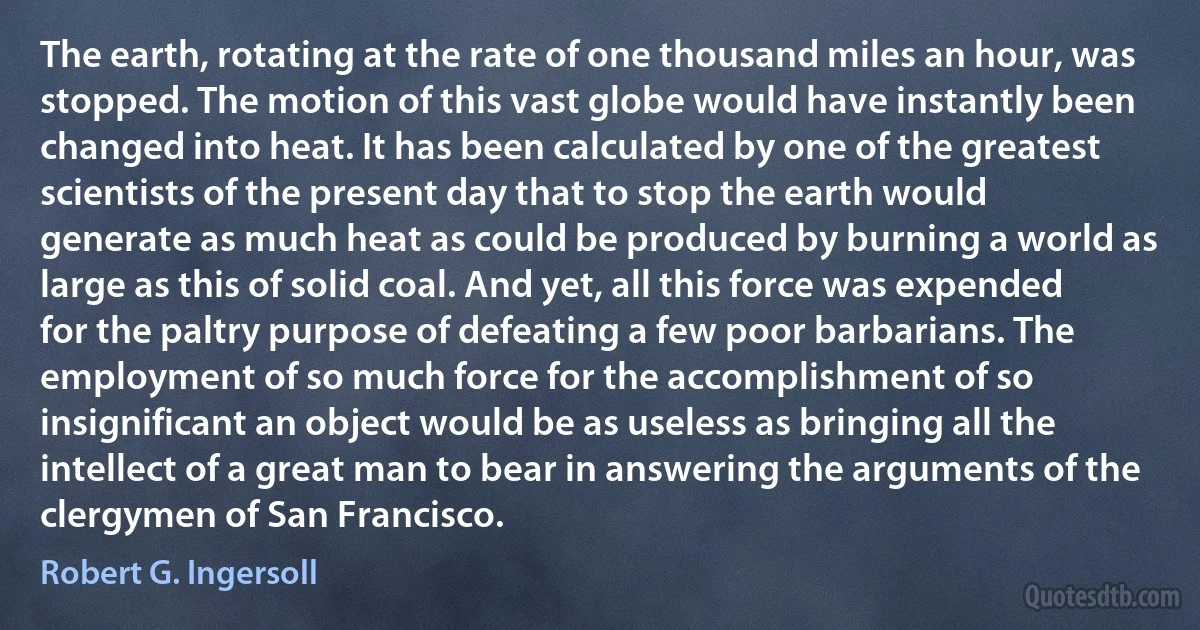Intellect Quotes - page 34
Imagine a person, tall, lean and feline, high-shouldered, with a brow like Shakespeare and a face like Satan, ... one giant intellect, with all the resources of science past and present ... Imagine that awful being, and you have a mental picture of Dr. Fu-Manchu, the yellow peril incarnate in one man.

Sax Rohmer
It seems to me imperative to re-establish the true dualism-that between vital impulse and vital control-and to this end to affirm the higher will first of all as a psychological fact. The individual needs, however, to go beyond this fact if he is to decide how far he is to exercise control in any particular instance with a primary view to his own happiness: in short, he needs standards. To secure standards, at least critically, he cannot afford, like the Rousseauist, to disparage the intellect.

Jean-Jacques Rousseau
And I think one of the things that's important for bringing about further progress is that we listen to each other and we understand our differences. I don't think it's necessary for us to all speak one language, or all have the same foods, or all have the same customs. But I do believe that there are some universal principles that are important. I believe that the most important principle is a very simple one that is at the heart of most of the world's great religions, which is treat somebody the same way you'd want to be treated. And if you start with that basic premise, then we will continue to make progress. But I also think that in order for us to make progress, we have to have that fellow feeling and we have to combine that with the use of our brains and reason, and our intellect. [...] That requires not just a strong heart, but also using our heads. And if we do those two things, then I feel confident that we'll make progress.

Barack Obama
More than one pathologist, chemist, homeopathist, and magnetist has quenched his thirst for knowledge in the books of Paracelsus. Frederick Hufeland got his theoretical doctrines on infection from this mediaeval "quack,” as Sprengel delights in calling one who was immeasurably higher than himself. Hemman, who endeavors to vindicate this great philosopher, and nobly tries to redress his slandered memory, speaks of him as the "greatest chemist of his time." So do Professor Molitor, J and Dr. Ennernoser, the eminent German psychologist. According to their criticisms on the labors of this Hermetist, Paracelsus is the most wondrous intellect of his age,” a " noble genius.” But our modern lights assume to know better, and the ideas of the Rosicrucians about the elementary spirits, the goblins and the elves, have sunk into the "limbo of magic” and fairy tales for early childhood.

Paracelsus
Bacon in his instruction tells us that the scientific student ought not to be as the ant, who gathers merely, nor as the spider who spins from her own bowels, but rather as the bee who both gathers and produces. All this is true of the teaching afforded by any part of physical science. Electricity is often called wonderful, beautiful; but it is so only in common with the other forces of nature. The beauty of electricity or of any other force is not that the power is mysterious, and unexpected, touching every sense at unawares in turn, but that it is under law, and that the taught intellect can even now govern it largely. The human mind is placed above, and not beneath it, and it is in such a point of view that the mental education afforded by science is rendered super-eminent in dignity, in practical application and utility; for by enabling the mind to apply the natural power through law, it conveys the gifts of God to man.

Michael Faraday
A philosophy without heart and a faith without intellect are abstractions from the true life of knowledge and faith. The man whom philosophy leaves cold, and the man whom real faith does not illuminate, may be assured that the fault lies in them, not in knowledge and faith. The former is still an alien to philosophy, the latter an alien to faith.

Georg Wilhelm Friedrich Hegel
That immense framework and planking of concepts to which the needy man clings his whole life long in order to preserve himself is nothing but a scaffolding and toy for the most audacious feats of the liberated intellect. And when it smashes this framework to pieces, throws it into confusion, and puts it back together in an ironic fashion, pairing the most alien things and separating the closest, it is demonstrating that it has no need of these makeshifts of indigence and that it will now be guided by intuitions rather than by concepts. There is no regular path which leads from these intuitions into the land of ghostly schemata, the land of abstractions. There exists no word for these intuitions; when man sees them he grows dumb, or else he speaks only in forbidden metaphors and in unheard - of combinations of concepts. He does this so that by shattering and mocking the old conceptual barriers he may at least correspond creatively to the impression of the powerful present intuition.

Friedrich Nietzsche
And certainly we should take care not to make the intellect our god; it has, of course, powerful muscles, but no personality. It cannot lead, it can only serve; and it is not fastidious in its choice of a leader. This characteristic is reflected in the qualities of its priests, the intellectuals. The intellect has a sharp eye for methods and tools, but is blind to ends and values. So it is no wonder that this fatal blindness is handed on from old to young and today involves a whole generation.

Albert Einstein

